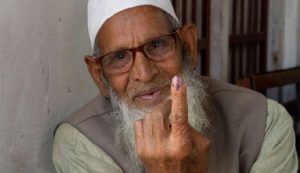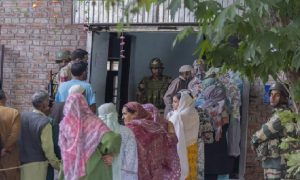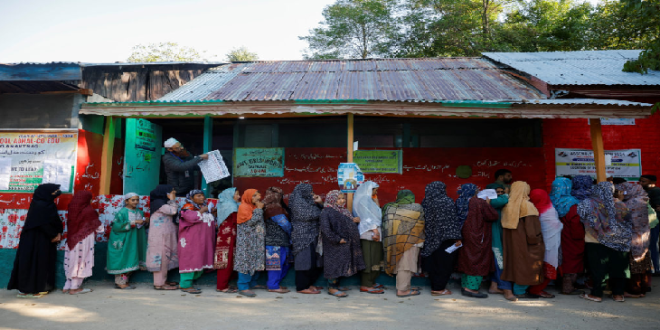20-09-2024
SRINAGAR: Voters have begun casting their ballots in regional elections in Indian-administered Kashmir.
Kashmiris lined up outside polling stations on Wednesday morning to vote in a local government election for the first time since the disputed territory lost its semi-autonomous status in 2019.
Nine million registered voters will choose members of the Himalayan region’s 90-seat legislature. After Wednesday’s first phase of voting, second and third rounds will be held on September 25 and October 1. Votes will be counted on October 8, with results expected the same day.
 Kashmiri political analyst Sheikh Showkat Hussain told media the election is significant because it has “become a sort of referendum” on the region’s historic special status, which was revoked by India’s Prime Minister Narendra Modi.
Kashmiri political analyst Sheikh Showkat Hussain told media the election is significant because it has “become a sort of referendum” on the region’s historic special status, which was revoked by India’s Prime Minister Narendra Modi.
That move, upheld by the Supreme Court last year, sparked anger and fear in India’s only Muslim-majority region, with many worried under Modi’s Hindu nationalism, New Delhi aimed to change its demographics.
Modi’s Bharatiya Janata Party-led (BJP) government has said that getting rid of the region’s special status restored normalcy in the area and helped its development.
The prime minister has urged Kashmiris to turn out to vote “in large numbers” to “strengthen the festival of democracy”. In the past, pro-independence armed groups have targeted elections in Kashmir, and voter turnout has been weak. The territory, however, recorded its highest turnout in 35 years in national elections held in April and May, with a 58.46 percent participation rate.
Kashmir has been at the centre of a dispute with neighboring Pakistan since 1947. India and Pakistan both claim the region in full but rule it in part, after having fought two of their three wars over the region.
Kashmir’s local election is being contested by regional parties promising to restore its special status and India’s main opposition Congress party which has allied with a prominent regional group. The legislative assembly will have powers to debate local issues, make laws and approve decisions for governing the territory. However, it will not be able to restore the region’s special status, with that the remit of the federal government.
The BJP is pitching development and a permanent end to “militancy”.
 The imprisonment of many young Kashmiris in distant Indian jails, along with local challenges such as rising drug abuse and unemployment, are major issues.
The imprisonment of many young Kashmiris in distant Indian jails, along with local challenges such as rising drug abuse and unemployment, are major issues.
Kashmir has an unemployment rate of 18.3 percent, more than double the national average, according to government figures in July.
“I will vote hoping it might change the job scenario or help in releasing so many people in jails,” student Tabinda Arif told media. “Everyone has suffered so much in the past five years, maybe things will change.”
However, Indian Prime Minister Narendra Modi told parliament last month that the armed rebellion in Indian-administered Kashmir was in its final stages due to his government’s “multipronged” strategy, implemented since his government scrapped the region’s special status five years ago.
Three days later, on July 6, two Indian Army personnel and four suspected rebels were killed in two separate gunfights in the disputed region’s Kulgam district, raising questions about Modi’s claim. Then, on July 8, suspected rebels ambushed an army vehicle and killed five soldiers in Kathua, a district located in the region’s Jammu division towards the south.
A week later, four more Indian soldiers, including an army officer, were killed in another gunfight with suspected rebels in the forests of Jammu’s Doda district.
 Pressmediaofindia
Pressmediaofindia




